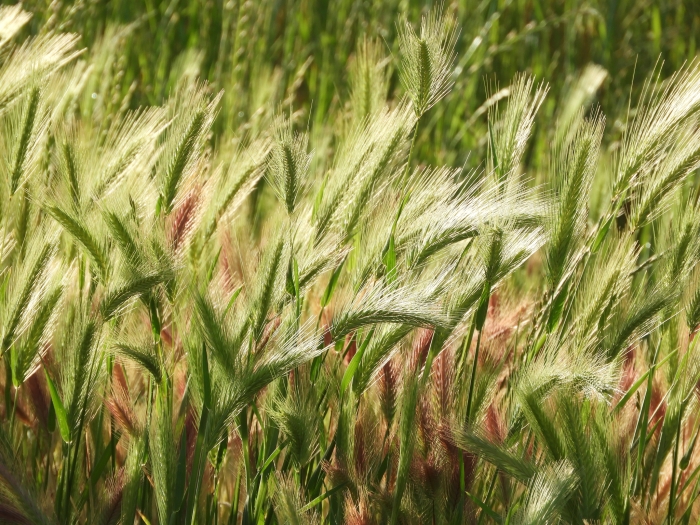Wall Barley
(Hordeum murinum)
Wall Barley (Hordeum murinum)
/
/

Mary K. Hanson
CC BY 4.0
Image By:
Mary K. Hanson
Recorded By:
Copyright:
CC BY 4.0
Copyright Notice:
Photo by: Mary K. Hanson | License Type: CC BY 4.0 | License URL: http://creativecommons.org/licenses/by/4.0/ | Rights Holder: Mary K. Hanson | Publisher: iNaturalist | Date Created: 2021-04-10T07:11:13-07:00 |










Estimated Native Range
Summary
Hordeum murinum, commonly known as wall barley or false barley, is an annual grass that is native to a variety of habitats including coastal areas, roadsides, and disturbed sites across the Mediterranean region, Central Europe, Western Asia, and North Africa. It typically grows up to 12 inches tall and features unbranched spikes that can reach 4 inches in length. Wall barley flowers from May to July, producing a modest display of greenish inflorescences. This species is well-adapted to urban environments and often colonizes empty lots and cracks in pavement.
Wall barley is valued for its ability to thrive in poor soil conditions and its resilience to drought, making it a suitable choice for xeriscaping and low-maintenance areas. It is also used for erosion control due to its fast growth and ability to establish quickly on disturbed sites. However, its invasive potential should be considered before planting, as it can spread rapidly and outcompete native vegetation. In cultivation, wall barley prefers well-drained, sandy, or gravelly soils and can tolerate a range of light conditions from full sun to partial shade. It is often found in areas with medium precipitation but can survive periods of drought.CC BY-SA 4.0
Wall barley is valued for its ability to thrive in poor soil conditions and its resilience to drought, making it a suitable choice for xeriscaping and low-maintenance areas. It is also used for erosion control due to its fast growth and ability to establish quickly on disturbed sites. However, its invasive potential should be considered before planting, as it can spread rapidly and outcompete native vegetation. In cultivation, wall barley prefers well-drained, sandy, or gravelly soils and can tolerate a range of light conditions from full sun to partial shade. It is often found in areas with medium precipitation but can survive periods of drought.CC BY-SA 4.0
Plant Description
- Plant Type: Grass
- Height: 1-2 feet
- Width: 1-2 feet
- Growth Rate: Rapid
- Flower Color: N/A
- Flowering Season: Spring, Summer
- Leaf Retention: Deciduous
Growth Requirements
- Sun: Full Sun
- Water: Low
- Drainage: Medium, Fast
Common Uses
Erosion Control, Low Maintenance
Natural Habitat
Native to a variety of habitats including coastal areas, roadsides, and disturbed sites across the Mediterranean region, Central Europe, Western Asia, and North Africa
Other Names
Common Names: Wall Barley, False Barley, Bulbous Barley, Cevada-De-Ponche-Verde, Cevada-Dos-Ratos
Scientific Names: , Hordeum murinum, Critesion murinum, Hordeum ciliatum, Hordeum leporinum var. murinum, Hordeum murale, Hordeum murinum f. fuscospicum, Hordeum murinum f. violaceospicum, Hordeum murinum var. pusillum, Hordeum simulans
GBIF Accepted Name: